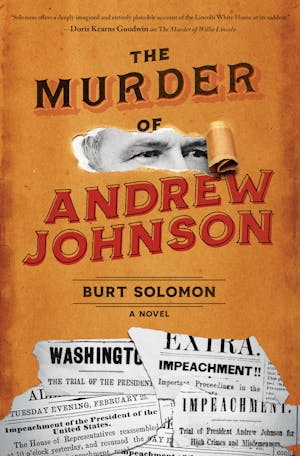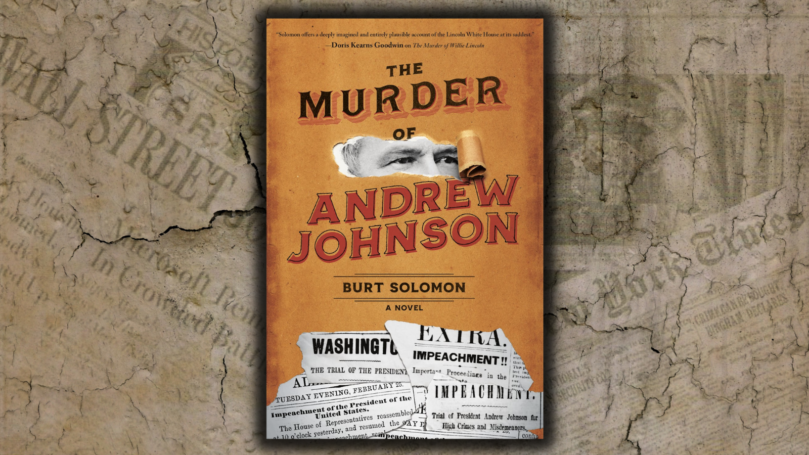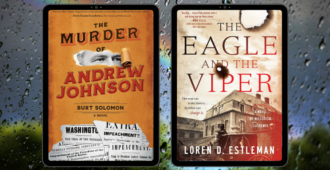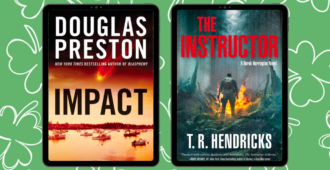 The next John Hay historical thriller from award-winning political journalist Burt Solomon, this time focused on one of America’s most controversial presidents: Andrew Johnson.
The next John Hay historical thriller from award-winning political journalist Burt Solomon, this time focused on one of America’s most controversial presidents: Andrew Johnson.
Andrew Johnson was called The Great Commoner, appealing to the masses, loathing the establishment and anyone he deemed elitist. Once Johnson made an enemy, you became his enemy for life. He saw insults where none were intended and personal loyalty meant everything…and his devoted fans would follow him into the depths of Hell. He was also the first U.S. president to be impeached.
Time however waits for no man and even the Famous (or Infamous) must leave this world eventually. But when a man has as many enemies as the Devil, what death could really be a natural one? From political opponents to most of his own family, the suspects are endless, and the truth not really wanted. John Hay, lawyer, sometimes governmental bureaucrat, and now journeyman investigative reporter, is set on finding that truth. And it may wind up killing him.
The Murder of Andrew Johnson will be available on October 3rd, 2023. Please enjoy the following excerpt!
CHAPTER ONE
Saturday, July 31, 1875
I’ll confess that I’d longed for a son—what new daddy doesn’t?—but I wouldn’t swap a bare-knuckled champion-to-be for the tiny girl who was smiling and squirming in Clara’s arms. Helen was four and a half months old, and she still had a sweetness I could smell halfway across the room. She started to squeal.
“Your turn,” Clara said.
“I’m not good at this,” I protested.
“Neither was I.”
She had a point, although I didn’t say so. I unbent from my burgundy bergère and reached across and took Helen into my arms. I began to rock her. The squealing ceased.
Clara beamed at me. She was nice enough not to tease.
“So, when’s the next one?” I said, surprising myself.
“I would imagine that is partly up to you,” Clara replied.
For a young woman reared on Millionaires’ Row, in this prim and proper age, Clara could be astonishingly frank about the practicalities of life. We were sitting in her father’s library, the rosewood shelves full of books with uncracked spines, in his Italianate mansion on suave and stately Euclid avenue, in Cleveland. This was where any American should aspire to live, even (or especially) if the money wasn’t his own. Mine wasn’t. I couldn’t help but hear the hammering next door, from the workmen building my new house. I mean our house—Clara’s and little Helen’s and mine. Actually, I mean his house, my father-in-law’s, Amasa Stone’s. It was his wedding gift, and naturally it came with conditions. We had left New York behind, after my five happy years at the Tribune, and had been nesting under Amasa’s (pardon me, Mr. Stone’s) roof for eight weeks, four days, and . . . let me think . . . thirteen and a half hours now. But who’s counting?
I worried that I’d made a deal with the devil. Not that Amasa Stone was a devil. He generally meant well, in a hard-nosed way, putting his own interests first. But that’s what people do, particularly self-made millionaires in a world that worships wealth, so I tried to keep my expectations low and my disappointments to a minimum. With mixed success, I might add. My job henceforth was to administer Amasa’s investments, in railroads and steel mills, in oil refining and banks, in stocks and silver, after the financial panic of ’seventy-three had nearly ruined him. (Not even Clara knew that.) My position, vaguely drawn, put me under Amasa’s thumb as well as his roof. But the work itself didn’t sound terribly taxing, and I figured that having my father-in-law finance our bread crusts would give me time to write my half of the epic biography of Lincoln that Nicolay and I had pondered ad nauseam over late-night brandies. Here, something was always in the larder, even if I didn’t know what a larder was. How lucky was I, at what I hoped was a tolerable cost in self-respect. Everything in life had its pluses and minuses, its benefits and costs—wasn’t that so? The goal was to unbalance them rightly.
Moving to Cleveland, not incidentally, made Clara happy, which she hadn’t been in New York. She was too reserved, too sensible—too pure of heart, if I may exaggerate, although not by a lot—to fit in comfortably in the East. I looked across at her. The baby had taken nothing from her health or good looks. She was the kindest person I’d ever known, but it was a kindness backed by steel. She had an unruffled sort of face, unlined, not delicate but handsome, with unapologetic cheeks and a determined chin. Her hair was braided loosely into a bun, and her dark sparkling eyes could peer inside you without seeming to try. There was nothing flimsy about her; her bosom was ample enough to hide in. She was twenty-five years old, to my thirty-six, yet she was sturdy and serene—and content—in a way I could only dream of. Clara was without guile. I had enough for the both of us.
Helen was wriggling again. I was ready to restore her to her mother’s embrace when there was a knock at the door, too deferential for Amasa. The butler entered. He was a black gentleman with a fringe of white hair around a lived-in face. He carried a silver platter on his fingertips as if he were a waiter at Delmonico’s.
“For you, sir,” he said.
A yellow envelope lay on the platter. Across the top, Gothic script announced:
Western Union Telegraph
Amasa owned a chunk of that, too. Scrawled underneath:
Mr. John Hay, Esq.
I could guess who had sent it—Whitelaw Reid, who had been my nominal boss and boon companion at the New-York Tribune. The Esquire was his idea of a jab.
I handed Helen back to Clara and used my bone-handled pocketknife to slit open the envelope.
My dear Hay, Andrew Johnson died this morning in Elizabethton, wilds of East Tennessee. The most hated man in America. Can you go? Reid
Can I? My wife and daughter would fare just fine without me, and my father-in-law would sputter at my gallivanting and then acquiesce. Occasionally I needed to do something absurd.
_____________
I caught the noon train south, toward Columbus. No trouble with the reservations, not when your father-in-law is a director of the railroad and of four or five others. I had a compartment to myself. It was paneled in mahogany, curtained in silk, upholstered in velvet, trimmed in ebony and gold, carpeted in a tapestry caressing my feet—a testament to what my pal Clemens has dubbed the Gilded Age. But what, pray tell, was wrong with gilded?
The conductor brought me the Columbus newspapers. The printers’ strike in Kentucky, the anthracite coal miners’ strike in Pennsylvania, the weavers’ strike in Massachusetts, the shoe cutters’ strike in New York— what on earth was the world coming to? I tried not to feel nostalgic for the blood and terror of civil war. At least right and wrong had seemed clear then, and the imperatives were obvious to all. Things were different now. I was a Republican to the bone, but I pined for the days when Labor hadn’t loathed Capital, and capitalism hadn’t been running amok. Its titans reigned as tyrants greedier than tsars. Vanderbilt was buying up railroads—Amasa’s, among others—and a Clevelander named Rockefeller was busy cornering the market in oil refining. This much was clear: The pastoral America was passing. The horse’s or ox’s pace was giving way to the bustle of rail. Industry, enterprise, expansion, ambition, acquisitiveness, extravagance, ostentation—anything worth doing was worth overdoing.
Below the front-page dispatches on the Missouri floods and the latest in the Reverend Henry Ward Beecher’s sensational trial for adultery, The Dispatch ran a short item:
Andy Johnson’s Apoplexy.
GREENEVILLE, TENN., July 31—Ex-President Johnson received a very severe stroke of paralysis at 4 o’clock on Wednesday at his daughter’s residence in Carter county. Feeling has been partially restored to his left side. He speaks intelligently, and hopes are entertained of his recovery.
Old news.
I tried to picture the dear departed. Physically, ol’ Andy had a presence. He was of solid build, with a massive head, a jut-jawed face, piercing eyes, thick hair to his earlobes. He was invariably clad in the style of the old statesmen, in doeskin trousers and a black broadcloth coat. I had never seen the man smile. The last time I had seen him at all (not counting the half hour he had hovered by Lincoln’s deathbed during that awful, awful night), he was drunk. That was on the fourth day of March in ’sixty-five, at the inauguration for Lincoln’s second term as president and ol’ Andy’s first as vice president. Before the ceremony started, he had gulped down a tumbler of whisky—blaming his unfinished recovery from typhoid fever—and then another and, as he was leaving to be sworn in, yet a third. (I had this on good authority, from Hannibal Hamlin, the man whose job he took.) He was sozzled when he delivered his inaugural address, ranting at the cabinet, lionizing “the people,” embarrassing everyone in sight, possibly including himself, until Hamlin prevailed on him to stop. Lincoln forgave him—of course!—but I am a lesser soul.
I stared out of the window awhile. The hills near Cleveland had slipped behind us, and the land lay as flat as a windless sea. Wood fences that used to be white surrounded fields of wheat and corn, strewn with red barns (red paint was the cheapest) and silos and stables. Once upon a time, or so I’d heard, a squirrel could scamper from the Atlantic shoreline clear to Ohio without touching the ground. But ever since the lumbermen had given way to farmers, those days were gone.
In Columbus, I picked up the evening newspapers, which had caught up with the ex-president’s fate. In The Cincinnati Daily Star:
Death of Andy Johnson.
GREENEVILLE, TENN., July 31—Senator Johnson, after a perceptible improvement last night, began again to sink a little after midnight, and died at fifteen minutes of three o’clock this morning.
I had felt fortunate to miss most of his presidency, which an assassin’s bullet began. What an unworthy successor to the Great Emancipator! Soon after Lincoln was martyred, I sailed to Europe, taking up leisurely diplomatic posts in our embassies in Paris, Vienna, and Madrid, so I followed Johnson’s failures at a distance. That was close enough. Granted, he didn’t smoke or swear or steal, so far as I knew, and I had never seen him spit (although I’m not alleging he didn’t). He told fewer lies in a month than most politicians spoke before breakfast. Those were his good points, overwhelmed by the bad. He was a vindictive man and a worse president, a bully and a demagogue who considered compromise a sin and never forgave a slight. He bungled Reconstruction—undermining the Freedmen’s Bureau, reneging on the promise of forty acres to emancipated slaves, pardoning Confederates, restoring the slavocracy to its former glory. He earned the unprecedented humiliation of getting impeached and, after his debacle of a presidency, slumped home to Tennessee. Yet even then, he refused to accept disgrace. Twice, he lost bids for Congress, but just this past winter, by the slimmest of margins, on the fifty-fourth ballot, the Tennessee legislature sent him back to Washington as a United States senator. Vindication at last!
Only now he was dead, the most hated man in America. He had divided a nation that longed for unity. He had been venomous toward his enemies, real and imagined, and had coarsened the civic discourse, wielding a truncheon in place of Lincoln’s scalpel. Who on earth would go to his funeral? Would anyone?
Ah, this was the story I would write for the Tribune.
A cow outside my window flapped his dewlap in my direction, undoubtedly meant as a salute. I returned to The Daily Star.
OBITUARY.
Andrew Johnson was born at Raleigh, N.C., December 29th, 1808, and was, consequently, nearly 67 years of age . . .
Most of his story I already knew. He was born into poverty in North Carolina, and his daddy drowned while rescuing two rich men when Andy was three years old. Lacking even a day of schooling, Andy was indentured at age ten to a tailor, before running away. He returned only to guide his mama and stepfather west, across the Appalachians, a blind pony pulling their cart of possessions. In East Tennessee, the rugged land of Davy Crockett and Daniel Boone, he began his political ascent, from alderman to mayor to legislator to governor to congressman to U.S. senator. He was a Democrat who idolized his namesake Andrew Jackson, Tennessee’s most famous son. Yet when the Southern states declared their independence, Johnson—alone among the Southern senators—opposed secession and refused to quit his seat. Accordingly, when the Union Army conquered Tennessee, Johnson was named as the state’s military governor and then, in the election of ’sixtyfour, as Lincoln’s running mate. The voters catapulted ol’ Andy into a vice presidency that was destined to last only forty-two days.
Maybe I was thinking about the stumbling pony because somehow I dozed off. Next I knew, the train was jolting to a halt, and the conductor was swinging a lantern and shouting, “Cincinnati!”
After a quick, unappetizing dinner in the depot of boiled mutton and a blotchy potato, I boarded the Knoxville train. Within seconds, I learned more than I wanted to know about the war’s impact on the nation’s railroads. I was consigned to a rickety car with streaked windows and straightback seats, wondering how in blazes I would ever get to sleep.
The porter was a sinewy young negro who belonged on a football field, if the college boys would have him. He must have noticed my look of puzzlement, because he chuckled in a kindly way and asked about my destination.
“Hope you be a patient man,” he said when I told him.
“Not usually,” I replied.
“You not from here, suh.”
It wasn’t a question. “From Illinois, growing up,” I said. “Now from Cleveland.” I left out Providence, Washington City, European capitals, and New York, the places where I’d most felt at home.
“You been South before, suh?”
“Not much.”
“It’s a different world down here, suh.”
“I like different worlds,” I said.
He pursed his lips and managed not to smile. “Some Ah do,” he said, “and some Ah don’t.”
“How long to Knoxville?”
“Five hours and thirty-seven minutes.”
“You sure of that?” I joshed.
This time he did smile, showing a gold front tooth. He explained that most of the railroad lines running north to south hadn’t been rebuilt since the war and hadn’t been any great shakes before then.
“Isn’t this an era of good feeling between North and South?” I said.
He smiled again as if I were joking, which I was. I inquired if I might purchase some bourbon or rye.
“Ah could oblige.”
It didn’t take him long, and the bourbon wasn’t bad. It warmed my chest and calmed my internals. The porter also brought two pillows and a tartan blanket that no varmints had used for their bedding.
When I turned and stared out the window, my reflection stared back. I can’t say that I looked my most debonair. My dark hair, center parted, lay too flat on my ghostly white head, which made my ears stick out. My face was too thin, my chin too insignificant, my features a trifle too delicate. Should I grow a beard to match my raffish mustache? I wet my fingers to tame my eyebrows. I looked tired as hell. I was tired as hell.
I took two deep breaths (I had learned this in the boxing ring) and braved another look at myself. Better. I was probably my severest critic—and my greatest admirer. I was pretty sure I spied the daredevil look in my eye, although I was possibly seeing it from the inside. I tried my crookedest smile, which lent a certain dash to my countenance. I had to acknowledge that women seemed not to mind it, including Clara. It would do. It would have to.
I reached for The Daily Star beside me. The flimsy newspaper had fallen open to page two, home to the editorials—my domain at the Tribune. It was a job I loved but for which I was only fitfully suited. I do not like to blame, and I mortally hate to praise. This editorial did neither.
Death of Ex-President Andrew Johnson.
The people of the United States will be astonished and shocked to hear of the death of ex-President Andrew Johnson, of Tennessee. Until last Wednesday he was in the full vigor of health. Now he had passed from among us in the most unexpected manner . . .
The word wedged in my craw. Unexpected.
Click below to pre-order your copy of The Murder of Andrew Johnson, available October 3rd, 2023!











